Haunting, dreamy, crazy nightmare thrills. There’s a reason I and several million other people my age and older remember so well The Legend of Lizzie Borden, the 1975 ABC made-for-TV splatter shocker: it’s flat-out brilliant.
By Paul Mavis
Directed by Paul Wendkos, written by William Bast, brilliantly edited by John A. Martinelli, and featuring Fionnula Flanagan, Ed Flanders, Katherine Helmond, Don Porter, Fritz Weaver, Bonnie Bartlett, John Beal, Helen Craig, Alan Hewitt, Gail Kobe, Hayden Rorke, Robert Symonds, The Legend of Lizzie Borden stars Bewitched’s Elizabeth Montgomery in the performance of her career as the willful, sneering, drugged-out—and homicidal (?)—Lizzie Borden.
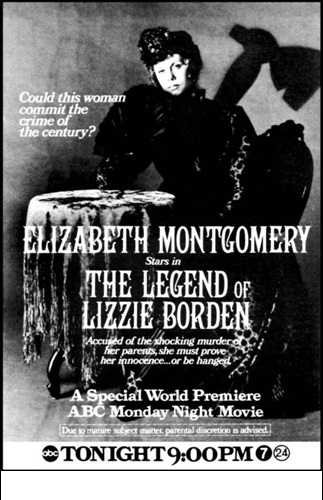
Hypnotically creepy, The Legend of Lizzie Borden is one of the best made-for-TV movies of the 1970s—and that’s saying something considering it came out during the “golden age” of that format. Perversion and psychological torment underpin the splatter killings, while Elizabeth Montgomery scares the sh*t out of you with a truly frightening, preternaturally effective performance. It’s a remarkable achievement in the MTV format, one that holds up even better after 42 years—The Legend of Lizzie Borden is must-viewing for fans of Montgomery and of the horror/suspense genre.
Click to order The Legend of Lizzie Borden on DVD:
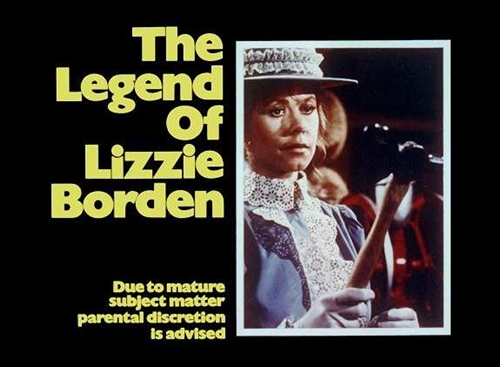
According to The Legend of Lizzie Borden, on a sweltering August 4th, 1892, in Fall River, Massachusetts, Adelaide Churchill (Amzie Strickland) notices Irish housekeeper Bridget Sullivan (Fionnula Flanagan) running from her employer’s home, frantically seeking help. As Churchill approaches the neighboring Borden home, 32-year-old spinster Lizzie Borden (Elizabeth Montgomery) rather distantly invites her in with a sedate, “Oh, Mrs. Churchill, do come in…someone has killed Father.”
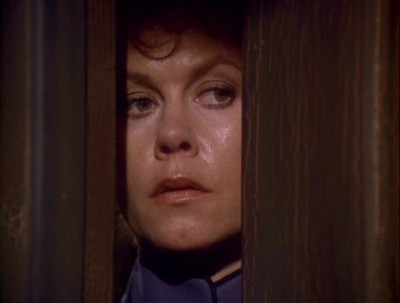
To Mrs. Churchill’s shock, she spies the mutilated corpse of wealthy Fall River businessman Andrew Borden (Fritz Weaver) laying on the downstairs couch, a victim of multiple hatchet wounds to the face and head. As Mrs. Churchill and visiting friend Alice Russell (Gail Kobe) try to cool down the spaced-out Lizzie, Bridget later discovers the hacked-up body of Lizzie’s hated step-mother, Abby Borden (Helen Craig), in an upstairs bedroom. Lizzie’s sister, Emma (Katherine Helmond), who was away for the week, returns, and is sickened by the sight of the corpses, which she has to identify. However, her first words to Lizzie indicate where her real fears lie: “Lizzie…did you kill Father?”
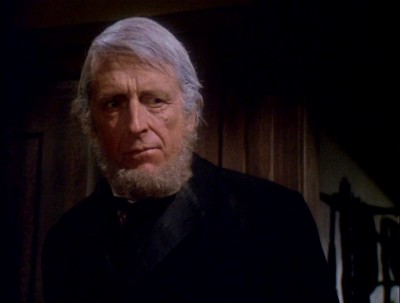
The murders startle the nation, particularly when the prime suspect—the strange, odd-acting Lizzie Borden—is jailed pending the sensationalized trial. Defended by the former governor of her state, George Robinson (Don Porter), and prosecuted by sharp, increasingly disdainful Hosea Knowlton (Ed Flanders), Lizzie stands trial, as she dreamily remembers the events as they actually happened on that horrific day…or, perhaps…as she would have liked them to have happened that day.
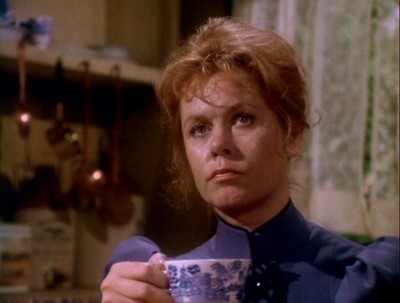
To put it plainly: The Legend of Lizzie Borden seriously warped my little 9-year-old mind when my parents let me stay up to watch it on a Monday school night, way back on February 10th, 1975 (no doubt they were lulled into complacency by Montgomery’s presence—after all: what harm could nose-twitching Samantha Stevens do?). Anyone in my age range or older who caught that particular ABC Monday Night Movie “world premiere event” will no doubt remember its then-rather shocking content and its powerful, hallucinatory production.
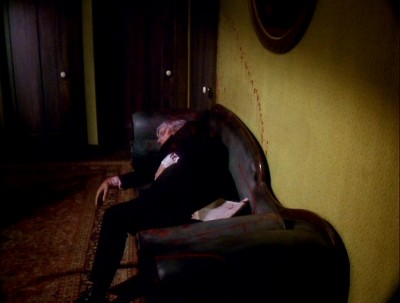
Indeed, a network MTV that briefly flashed nudity and foul language was unheard of at the time. That may be Montgomery seen topless in a side mirror shot, and, through the magic of DVD, you can now freeze and see a few frames of her naked breasts during the attacks, as well as clearly hear Flanagan mutter, “The bitch!” at one point (remarkable that those moments were allowed on a 1975 network broadcast). Add to that The Legend of Lizzie Borden‘s barely concealed themes of pedophilia, incest, drug addiction, and even necrophilia for god’s sake—all while America’s TV sweetheart, adorable witch Samantha Stevens Elizabeth Montgomery hacks away at her parents and single-handedly introduces the splatter/gore genre to television—and you have a made-for-TV movie that was destined to leave an indelible imprint on those-then more sheltered network viewers. It scared the daylights out of me when I saw it back then; luckily, The Legend of Lizzie Borden is even better than I remembered it: a fascinating, hypnotic exercise in psychological grotesquerie, married to a beautifully fractured bit of arty horror.
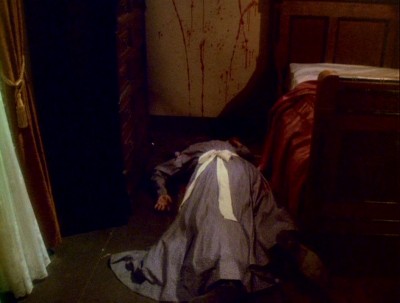
I’m certainly no expert on the Borden case, but having read a little bit about it, The Legend of Lizzie Borden sticks reasonably close to most of the facts of this still-unsolved crime. Some events and characters are eliminated or shuffled around, but that’s to be expected with any biopic. The script postulates that Lizzie committed the murders in the nude (she subsequently washed off the blood), thus eliminating any evidence on her clothes (from what I’ve read, though, it doesn’t sound like she or her clothes were checked for bloodstains by the cops, anyway). It’s a proposition ripe for TV exploitation when the beautiful Montgomery is the one doing all the hatchet-hacking (and yes, there apparently really was a “European cut” that did include full frontal nudity of Montgomery when The Legend of Lizzie Borden was released in big-screen theaters over there…and no, we’re not getting that version on this disc. More about the movie’s runtime below).
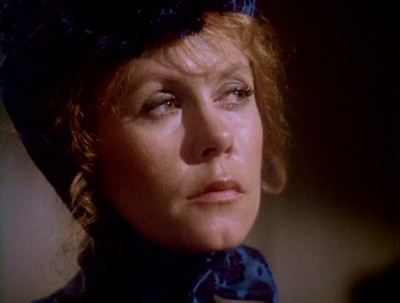
In the end, though, it doesn’t matter at all if The Legend of Lizzie Borden is reasonably accurate to the historical record or complete fantasy—it’s a frequently dazzling work of art that conveys multiple “realities” that play far more “true” than the dry facts of this particular case. An intricate puzzle of exposition that’s expertly fractured and re-arranged to give a startlingly subjective impression of the crime and its (maybe) perpetrator, by the end of The Legend of Lizzie Borden, we’re not sure of anything, of what’s real or imaginary, and particularly: of the guilt or innocence of Lizzie…or, for that matter, the state of her mind.
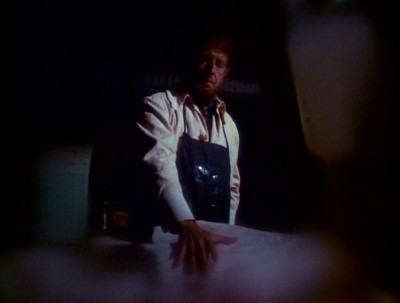
Aside from what we see outside of Lizzie’s perspective, are her flashbacks of memory actual recollections of the crimes she committed? Are they morphine-induced hallucinations (we learn that from the day of the crime until the end of her trial she had been given hefty daily injections)? Or are they the wishful fantasies of an angry, possibly psychotic—but innocent in the end—daydreamer? Scripted by William Bast (Hammerhead, The Valley of the Gwangi, The Betsy), The Legend of Lizzie Borden refuses to reassure us on any of these scores; we’re left uneasily on our own to sort out if what we’re seeing is true or not. Completely unreliable narratively—and therefore, quite unnerving—The Legend of Lizzie Borden turns out to be far more “true” to the nature of this heinous, bizarre, now-unsolveable crime than a “straight” factual imagining could ever be.
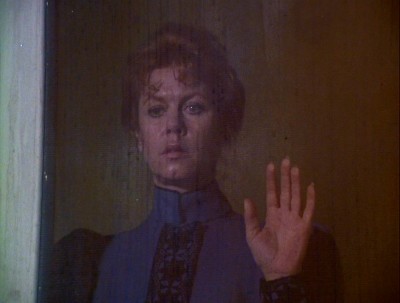
This is true not just for the script, but for the stylized production, as well. Shot on what looks to be a typically small made-for-TV budget back then (probably no more than half-a-million), most of the action takes place in the dingy, cramped Borden house set and a courtroom mock-up, with just a few brief respites to the backlot. Cinematographer Robert B. Hauser (plenty of TV as well as big movies like The Odd Couple, A Man Called Horse, and Le Mans) uses lots of wide, distorting lenses and off-kilter camera angles to further compliment the dirty, grungy look of the Borden house, resulting in a dark, jaundiced look, with creepy shadows in every corner of most shots (when we get to the murder reenactments, Hauser goes hand-held—certainly not the norm at the time for network offerings—with disquieting, shaky results). The score by Billy Goldenberg, with scary shock cues alternating with a period-sounding Butch Cassidy and the Sundance Kid-like plink, is highlighted by an eerie “La la la la la” chorus, putting the viewer “off” from the opening scene (an impressive, instantly worrying crane shot of the town tower clock, ominously chiming the time of the murders).
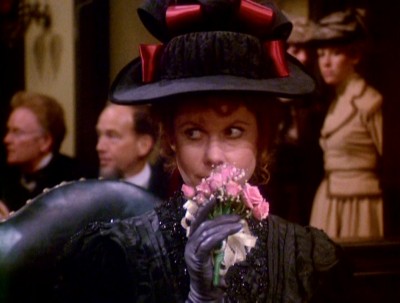
Director Paul Wendkos, an undervalued veteran of both big and little screen outings (everything from the original Gidget and The Mephisto Waltz to excellent MTVs like The Strangers in 7A and Susan Blakely’s Secrets) keeps the pace deliberately lethargic and drowsy, creating a half-asleep inevitability to the sequences that makes you think you’re watching someone’s dream (or nightmare) inexorably unfold. Punctuating this trance-like state is John A. Martinelli’s dazzling editing scheme, with its split-second shock cuts rupturing the already jumbled authenticity of the narrative, culminating in the murder reenactments where the action is slowed down and surrealistically repeated (that axe swinging over and over again), giving us a palpable sensory experience of sickening homicidal rage. It’s entirely appropriate that a highly unusual solo “Edited by” credit is given to Martinelli immediately at the movie’s final freeze-frame, on a split screen with Montgomery’s face, before the other credits roll (I can’t think of another made-for-TV movie that has so honored an editor—and rightfully so).
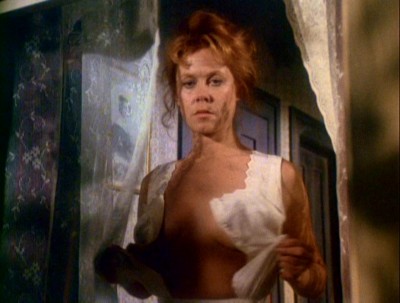
If The Legend of Lizzie Borden was only a stylized piece of surreal terror, it would be a noteworthy entry in the made-for-TV horror genre (I’d love to compare it to another M.I.A. MTV horror outing I remember with fondness: Spielberg’s Something Evil). From a marketing standpoint, ABC was correct in exploiting in their promotions the then-rather remarkable shots of Montgomery stalking around in the nude (as tempting as that prospect is…only a brief side shot can be deduced: your mind is doing the rest here). However, there’s far more going on beneath the surface than those prurient details…and all of it most unpleasant.
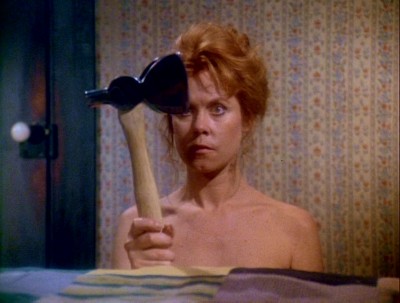
Scripter Bast postulates that Lizzie Borden was “special” (“psychologically disturbed” seems to be the final diagnosis) in a seriously screwed-up family on the brink of shattering apart. A manipulator (Lizzie’s step-mother knows her game) and petty thief with an angry streak a mile wide, Bast’s Lizzie has been shaped by an unnatural, destructive relationship with her father. As a child, she puts her favorite ring on her widowed father’s wedding ring finger, and kisses him full-on—a memory (or fantasy?) that’s immediately followed by another flashback where Lizzie, in a nightgown/wedding gown, sensuously kisses her dead father’s cold lips. Later, she sees her father, in this flashback an embalmer, resisting the urge to look at a naked corpse…before he begins to fondle it, as the camera pans away to young Lizzie’s shocked face (how that got by ABC’s Standards and Practices I’ll never know).
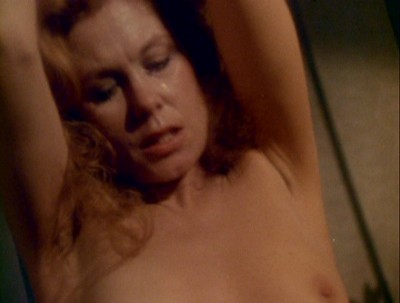
Sex and death are further linked in Lizzie’s mind when her father tries to calm Lizzie’s fears about her mother’s death, when he forces her to touch a dead body, remarking on how enjoyably cool the skin is…before the embalming tube comes loose, orgasmically spraying a screaming Lizzie with blood (do you know how wild all this was to a 9-year-old kid back in ’75?). The Legend of Lizzie Borden‘s all-but-open insinuations of perversion in the Borden house run throughout the movie, with Montgomery and Fritz Weaver exchanging heavy glances as they trade loaded lines: “Would you like to take a nap before dinner?” she suggestively asks her prone father, as he smiles knowingly at her, before a flashback where he exclaimed, “We were always so close…especially close,” to her pointed return stare. This quietly corrosive undertone of sexual deviancy runs throughout the movie, further wedding the narrative to the horror elements’ framework.
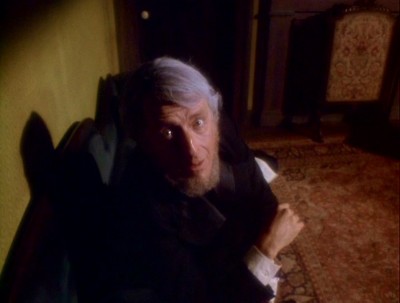
Perhaps most intriguing of all, The Legend of Lizzie Borden weaves an unmistakable feminist gender politics thread throughout it storyline, one that bears potent fruit. From small little asides like Lizzie flirting with the judge and the men in the jury box, to larger issues like male ownership, where Lizzie’s father angrily declares he owns everything in his house, even Lizzie’s pet pigeons (which to her horror, he slaughters with a hatchet), the notion that Lizzie’s obvious attempts to game her trial through “cheap, feminist sentimentality” as prosecutor Flanders sneers, is counterbalanced by the understanding that whatever Lizzie’s own psychological problems may be, the controlling patriarchal society of 1890s Fall River ain’t helping her head by a long shot.
In an unexpected scene between Flanders and the up-to-now unimportant character of his wife, Bonnie Bartlett, Flanders rages against Lizzie’s obvious tricks of feminine seduction to save her hide…as he impatiently snaps at his wife for the undercooked dinner she’s prepared him. Bartlett, her head down, replies that “you men” have no one to blame but yourselves if powerless women like Lizzie fall back on the only thing left to them: a male-imposed notion of femininity. Bartlett tries to elaborate by telling her husband he has no idea how heavy are the copious amounts of petticoats and woolen garments that women are required to wear (clearly implying other weights and burdens on women)…before we cut to a shot of Flanders looking exceedingly uncomfortable. It’s a great scene, particularly when you extrapolate out from it, and start thinking about Lizzie’s fury at the notion she might be cut out of her father’s will (and thus be rendered powerless, with no job, husband, or independent source of income), and then her murder scenes, where Lizzie is fully stripped—and liberated—letting down her hair (that, uh…seminal Victorian symbol of feminine sexuality) just for Daddy’s kill. It’s yet another fascinating subtext in what’s supposed to be just an enjoyably flashy TV suspenser.
Last but certainly not least is The Legend of Lizzie Borden’s talented cast—particularly Elizabeth Montgomery’s turn here, which is nothing short of breathtaking. The supporting cast, made up of old pros and veterans from countless TV and movie outings, are uniformly fine, with Ed Flanders, Fritz Weaver, and Fionnula Flanagan stand-outs (Weaver was seemingly born to play these kind of twisted, weirdo authoritarian figures). It’s Montgomery’s performance, though, that won’t leave you. Always looking off somewhere else, her dead eyes reacting as if she’s hearing some faint, far-away murmurings in her head, Montgomery, in an instant, can go from these dream-like reveries into flashes of truculent peevishness, or snappish impatience, or inappropriately-timed giggles (when she sees her step-mother’s hideously mutilated corpse), to psychotic anger—all with truly frightening gravity. Her strange, sometimes trance-like line readings, putting mountains of implied meanings into the simplest sentences, are miles away from the performance that most people know her from—Bewitched‘s Samantha Stevens—the role that eventually bored her to tears and drove her into parts like Lizzie Borden out of artistic self-survival.
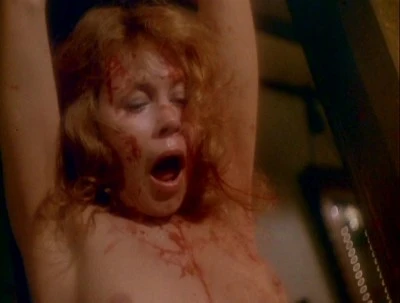
Montgomery, a consummate television actress, knew that the tube—at least back then—was all about the close-up and the eyes, and she gauges her performance accordingly, staying relatively immobile during the first part of the movie, with her eyes—the same eyes with the same enigmatic stare of her equally complicated actor/father, Robert—glazing over with an odd, detached look, before a hard glint of wickedness inevitably comes over them. As The Legend of Lizzie Borden moves toward the “revelation” of the murder scenes, explaining what (might have) happened, director Wendkos accentuates Montgomery’s sensuous body in a most deliciously aberrant way, as we’re encouraged to get turned on by her undressing, followed by her nude kills (for the slowpokes in the audience, he has her slowly caress the hatchet’s phallic handle).
Lizzie has shaken off the heavy garments she’s been forced to wear in the sweltering heat, as she mercilessly descends on her perceived oppressors, the camera slowing her movements down greatly as she swings and swings, her body heaving in a gauzy, dreamy, grotesque parody of sexual fulfillment, as she spatters her body and face with blood (wild, man). Wendkos’ final shot is perfectly realized: Lizzie, immobilized again in expensive finery—perhaps Father’s riches didn’t free her after all?—stands stock-still after her sister asks her one last time, “Did you kill Father?”, while Wendkos’ camera slowly revolves around the silent Lizzie, as Montgomery stares inscrutably at Helmond. Lizzie has come full circle—a full (sexual) revolution, if you will…with absolutely no psychological resolution, or even cathartic relief. She is unsolved…like her murders.
A special note on the run time of this CBS DVD, since it’s become something of a minor controversy with so many fans: The back of the DVD case lists it at “approximately 100 minutes” (sounds like someone in Copy didn’t actually do a time check). I’ve seen several sources list the movie run time at 100 minutes (I wouldn’t trust an IMDB run time, though, as far as I could throw the internet), with the “European cut” being four minutes longer. And yet…I’ve seen no hard proof or even reliable sources for that latter time. Were four minutes added for the European release? No idea. But this particular version of The Legend of Lizzie Borden actually runs 96 minutes and change. Now, that would allow about six minutes of commercial air time per half-hour of a two-hour broadcast slot. That’s slightly longer than the five minutes you would assume was the norm in ’75 (and which would match the 100 minute runtime).
However…it wasn’t unusual for a minute or even 30 seconds of local ad time to be sold as well, per half hour, and most official run times don’t take into account network intros and bumpers and their own promos run during a particular broadcast, as well—particularly during “sweeps,” when such network promotion was increased. And The Legend of Lizzie Borden was shown during “sweeps” as a special movie event (nor do PAL conversion issues seem to be relevant here, either). So…is anything cut here? I don’t have a photographic memory, particularly after 42 years, so…who knows? But nothing jumped out as “missing” from my memory when I watched this version—it all seemed there to me (unlike, say, the disc version of the MTV, Frankenstein: The True Story, which immediately smelled wrong in a few parts). If anybody has solid proof otherwise, by all means send it to me, and I’ll gladly amend the review.
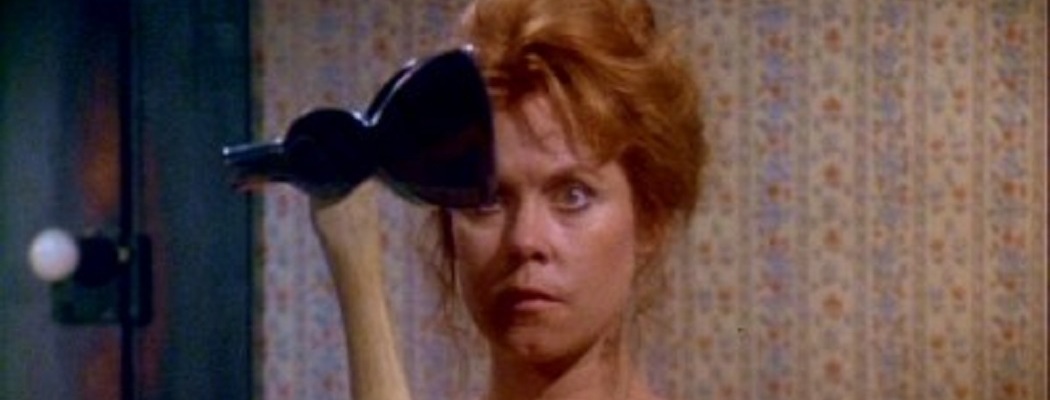


[…] it might well have joined the ranks of fondly remembered titles like Duel, The Night Stalker, and The Legend of Lizzie Borden, just to name a […]
LikeLike
[…] Winter Kill, Wonder Woman, Hey, I’m Alive, Satan’s Triangle, The Hatfields and the McCoys, The Legend of Lizzie Borden, and Trilogy of Terror–just to name a very few–became legendary memories for huge swaths of the […]
LikeLike